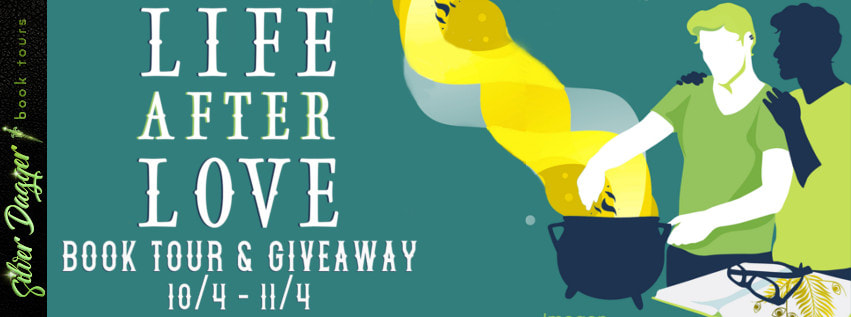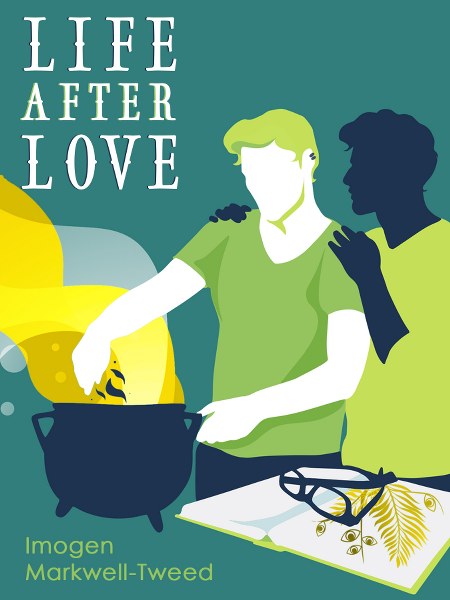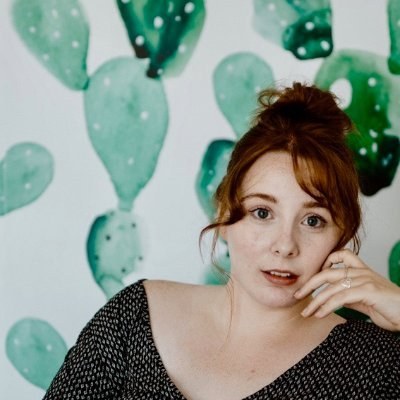
Can you, for those who don’t know you already, tell something about yourself and how you became an author?
I’ve been writing for as long as I can remember. Originals, fan fictions, stories half-way between were how I spent most of my time when I was growing up. In college, I started ghostwriting romance as a part-time gig. It quickly grew bigger than that and after a few years of working in the industry as a ghostwriter, I decided to start publishing my own original work. I started writing for Bryant Street Shorts over on Scribd, an exclusive platform similar to Kindle Unlimited. I’m starting to branch out to selling my own stories now. I’ve been very lucky in my journey to be able to write about things that I’m super passionate about.
Which of your novels can you imagine made into a movie?
It sounds cheesy because it’s the one I’m promoting right now, but definitely Life After Love. The absolute first iteration of this story I wrote was actually a short TV pilot for a class I took in undergrad. It was a little less romantic and a little less gay, but I’ve always been able to really see the cinematic aspects of this story.
What inspired you to write this book?
I was given a word count, a genre, and free reign from the editor where this story was originally published. “Write whatever you want in paranormal romance.” So, in a lot of ways, Life After Love is the most fantasy-fulfillment story I’ve ever written because it was entirely just what I wanted to read. There’s this scene where Danny is commenting on Adam being able to wash dishes in super hot water because he’s a ghost. After it came out, my best friend messaged me with about twenty laugh emojis and said “You made your dream man: a ghost who can do the dishes for you.” And that’s truly what this story is to me: just my dream story. I don’t know that I really was inspired by any one thing, it was just everything that I love about romance, about paranormal shorts, and about queer fiction. Two best friends slowly falling in love, with the literal universe against them, fighting against all odds.
What can we expect from you in the future?
All the stories I write, at least right now, are queer and feature happily ever afters or happily for nows. I love the romance genre and being able to write short, queer, happy stories has been so good for my soul. I do love my fair share of pining, yearning, and angst, and try to incorporate that, but never at the detriment of my characters’ ending happiness. I’m always jumping to different sub-genres, testing both my skill and interest, but these are the themes I keep always.
Where did you come up with the names in the story?
It’s not a fun answer but honestly what I do is, assuming the characters aren’t meant to have a particular religious, political, or ethnic background, I just Google the most popular names from the year they’d be born and choose two that I like and think fit together. It’s such a boring answer but it’s the only way to keep me from falling into crippling ennui about naming so many characters.
Did you learn anything during the writing of your recent book?
I think I learn something in every single book I write. I write in the format of fast-fiction, which basically means I spend very little time, objectively, on each book. On average, from conception to finished draft, it’s about 30 days. It’s not the easiest way to write, but one of the things I love about it is that it doesn’t allow me to second guess myself, my characters, or my stories. I have to jump in, commit, and finish it. I think the process of writing that quickly and that consistently— it’s been my full time job for about a year, and part-time for years before that— is that I am constantly testing myself, developing my skills, and redefining what I personally think is a good story.
In my latest book, I’m learning that the characters don’t need to be perfect to be the perfect fit: their flaws can stay flaws, as long as they’re still changing, adapting, and healthy for each other. Tying up the loose ends is important, of course, but I want them to feel real, human, and full, and that means flawed. I’m trying to play with that as I write my current book about an Alpha Male.
What is your favorite part of this book and why?
There is a scene, and I think at this point it’s maybe 400 words, where Adam throws Danny’s candles out of the window because he thinks it’s a fire hazard. He’s really insistent that candles are dangerous and Danny doesn’t care because he’s human and loves a candle. The original scene was probably 1500 words, maybe longer, and it was entirely irrelevant to the plot. And yet. I think it was my favorite scene as a reader and a writer. I just found it so funny. This arguing about candles of all things with your ghost-best-friend-slash-boyfriend. It comes up once or twice more in the book and I laughed every time.
Do your characters seem to hijack the story or do you feel like you have the reigns of the story?
Yes, absolutely. I try to write character-first stories because that’s what I like and what I find motivating in romance. So the first thing I do as a writer is think about my characters: I make them playlists, I consider what their daily routine would be, their desires and fears. I try to make them as real to me as my best friends. Then, I start writing.
I do come up with basic outlines— major plot points, the scene for each chapter, but I let the dialogue and nuances of their personalities really lead. In LAL, I was writing a scene and all of a sudden, Adam just had to tell Danny about his past. It wasn’t what I planned or thought would happen there, but they were having such a good time, he was feeling so seen and loved, and it was like he was demanding to have control over that moment, to share back. I’ve learned to listen to the soft voices of my characters because sometimes the most intimate moments in life happen accidentally, quietly, without any planning. And for the characters, that happens sometimes, too. I imagine them sitting there, talking, and all of a sudden, I just know that one of them knows that they’re in love. And if they know that now, how does that change everything? We don’t control the major events in our lives most of the time, only how we react to them: that’s what I try to replicate in my books. The plot will happen, but it’s how they move and care and love each other that matters and changes things.
Have you written any other books that are not published?
Yes! I write fast fiction novellas with Bryant Street Shorts on Scribd. With an account, you have access to almost twenty novellas I’ve written in the past year. I also publish on my Patreon, and have quite a few books not published in the works.
Pen or type writer or computer?
The idea of being so aesthetically pleasing as to write with a typewriter or in a nice notebook is what drives me through the days— but in honesty, it’s me hunched over a laptop with a blanket over me.
A day in the life of the author?
I wake up at about 8am to take my dog out on his first walk of the day. Then, I consider doing pilates, decide to dial it back to yoga, and eventually actually do some casual stretching. I start work between nine and ten, depending on if I have any chores or errands to get done with for the day. Then, I finish up any work I have for my copywriting clients, make sure I’m clear on my emails, social medias, and other sort of ‘busywork’, and start writing. I usually write to about 3 to 5,000 a day, depending on how close I am to my deadline and if I have other projects to work on. I’ll write till about three o’clock, take an hour or two of a break, and walk my dog again and cook supper. If I’m okay with where I’m at word-count wise, I’ll write pretty slowly with the TV on. Otherwise, I’ll stay in my office until I get to where I need to be.
While the work is pretty much the same, the amount of time I work differs. I try to stick to five or six hours a day, six days a week, except for the last week a month, where I tend to work a lot more to finish up projects. This is just because for me, writing the beginning part of the book is a lot slower and more mentally taxing. Obviously, if I have clients for copywriting or editing, things shift around, but this is what I try to do.
Advice they would give new authors?
It’s cliche but write what you want to read. I spent a lot of time at the beginning of my writing career considering what it is I needed to do, or what books I needed to write. But the truth is, I don’t want to write the best book ever written. I want to write beautiful, soft love stories, funny stories, stories that after you’re done, you feel better for a little bit. I want to write things that I wish I could have read when I was younger. Maybe you do want to write the best book ever written— but I think figure out what it is you’re wanting, what it is you want to say and what you can say, and go forward from there.
What are they currently reading?
Cemetery Boys by Aiden Thomas, Tamson’s Hallow by Wendy Dalrymple, and Midnight Sun by Stephenie Meyer— that one is taking me a while because I want to scream at the characters a lot.
Do you try more to be original or to deliver to readers what they want?
I try to be original. Of course, as I write romance, I stick to some of the conventions and tropes. I respect the genre and that means understanding it. So, for example, I’m not going to kill off a character— I write romance, and that means HEA, and that’s what I’m going to deliver. But other than that, I try to just write what I think is good, interesting, and honest to the characters.

On the other side of the kitchen, with arms folded and eyes narrowed, the ghost of 3B stares Danny down.
Danny is a reasonable guy. He likes order and precision, is always the one who balances the books at the coffee shop he works at, uses a spreadsheet for his personal budget; he likes reason. But there is no reasonable explanation for why there is a ghost in his kitchen having a staring contest with him.
Still, it’s happening, so Danny tries hard not to blink. His eyes water. One twitches.
“Goddammit!” He throws his hands up, glaring hard at the ghost when it lets out a cheer. “Shut up.”
“It’s not my fault I’m better at staring than you,” the ghost says, grinning widely. “To be fair, I have had a bit more experience than you.”
Danny points a warning finger at the specter before taking a deep breath. “I’m going to need my kitchen, you asshole. I actually eat.”
“You won the bedroom,” the ghost says, shrugging. The only thing breaking the ghost’s bored demeanor is its still-twitching lips, a grin fighting its way across.
“This is my apartment.” Danny tries again for the logical argument. “It was mine first.” The two had been through this once already. “I’m the one paying rent.”
The ghost doesn’t walk so much as appear next to Danny in the next second. “There’s real discrimination in the job market. No one wants a dead guy.”
Danny snorts. “The Realtor should have led with this.”
“And yet,” the ghost shrugs, disappearing before blinking into existence, sprawled out on a kitchen chair.
Danny side-eyes the flickering ghost. He lost the remote control to a round of rock-paper- scissors, and now the kitchen to a staring contest. At this rate, he’d be lucky to keep the bathroom.
Danny considers for a moment and arrives at the conclusion that there are two options.
Option one: Move away from this literal haunted house. That’s the plan that makes sense.
There is a ghost, and that really is not in the lease. But Danny doubts that the property manager will believe him. There’s no way that Danny would get his first month’s rent and deposits back. He can’t afford a different place.
So, option two: Befriend the ghost. Sure, the ghost is dead. Or undead. Or… well, he doesn’t exactly know the proper adjective. Up until two weeks ago, he’d been a staunch unbeliever, and he hadn’t studied occult terminology. He probably should now.
This is crazy. Danny is crazy.
Danny tentatively sits across from the ghost. It smiles; Danny frowns.
The ghost is shaped like a man — maybe is a man? Is there an appropriate way to ask a ghost about its relationship to human gender? Danny files that away for later.
At any rate, the ghost has long hair, falling just an inch or two below the shoulders, blonde, almost white, but it’s hard to see; the ghost isn’t see-through or anything, but difficult to focus on. It’s not a physical thing as far as Danny can tell; more like reading when it’s too dark. He has to squint to really see the sharp outline of the ghost’s body.
“What’s your name?”
The ghost’s head snaps up and its eyes narrow on Danny. They’re brown, Danny thinks, and large. The ghost has nice eyes. “I’m Adam.”
Adam. Adam the Ghost.
Danny lets out a laugh. It’s just on the line of hysterical. “Sorry I haven’t asked yet.”
“I get it,” Adam shrugs. “Ghost, human. Bound to be difficulties.”
Danny doesn’t realize he’s biting the inside of his cheek until he tastes blood. “Listen, we gotta… hash this out, I think.”
Adam’s eyebrows pull together. “Hash what out?”
“I can’t live without my kitchen, man!” Danny buries his face in his hands. “I need… my fridge! The coffee pot. And I want to watch TV.”
There’s a flicker across Adam’s face; not an expression, though that’s there, too, but a literal
flickering of his visage. He appears and reappears, starting with his face. Danny laughs again. He’s going to need so much therapy.
“You’re staying?” Adam asks, after a long pause.
Danny lowers his hands. He shrugs. “Yeah, man. You’re staying?”
Adam tilts his head, still frowning. He’s suddenly much clearer than he has been to this point. “I’m staying.”
There’s another pause that Danny is too exhausted to try to understand. He raps his knuckles on the table. “I’m going to go sleep. Forever!”
He leaves the kitchen and tries not to be weirded out by the silence. Of course Adam’s silent.
He’s dead.
Well, that’s that, then. Danny has a ghost roommate.









great cover
Thank you, Jodi!
Very interesting premise. I like the cover.
Sounds interesting. I’ll check it out.
The cover looks great. It sounds like an intriguing book.
I love me a good, well written ghost story and this one seems to be one I could become quite entertained with. Good interview and thanks for sharing!